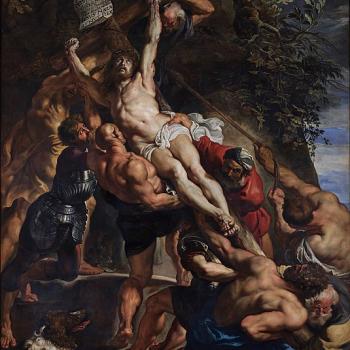The word “advent” derives from the past participle form of venire, the Latin word for “to come,” plus ad, which means “to.” So the term literally means “has come to.” The season of Advent, which we have now entered, means that Jesus “has come to” us, to you.
This reminds me of what Luther says in the Large Catechism about the importance of a prepositional phrase:
There is besides this command also a promise, as we heard above, which ought most strongly to incite and encourage us. For here stand the kind and precious words: This is My body, given for you. This is My blood, shed for you, for the remission of sins. 65] These words, I have said, are not preached to wood and stone, but to me and you; else He might just as well be silent and not institute a Sacrament. Therefore consider, and put yourself into this You.
















